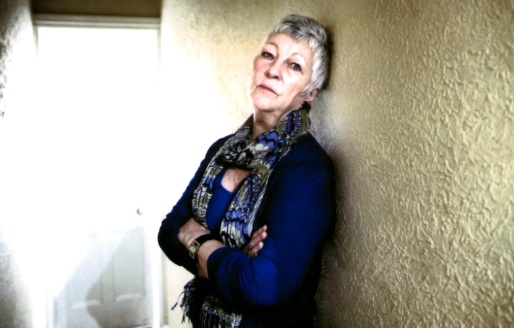‘Susan lived the injustice of her wrongful conviction every minute of every day,’ says Dorothy Cooksey, a family friend of Susan May who died in October 2013. ‘It took over her whole life.’
Susan May was convicted of murdering her elderly Aunt Hilda Marchbank in 1997 after she was found beaten and suffocated in her home. The crux of the prosecution case against May rested on ‘bloody’ fingerprints found on the wall. However, after uncovering a series of botched tests and police inadequacies, including the failure to disclose the sighting of a red car used by a known heroin addict outside Marchbank’s house on the night of the murder, forensics later showed that the handprint was in fact sweat, and made before the murder. May’s case was referred to the CCRC in 2010 and now remains with the watchdog ‘under investigation.’
-
Earlier this year Geoff Goodwin, Dorothy Cooksey’s brother made a film on the case of Susan May here
- This article was first published on www.thejusticegap.com on March 25, 2015. It has been updated to include the film.
Susan May maintained her innocence throughout the 12 years she spent in prison, despite warnings that she would not be released by the parole board unless she showed remorse. When May was eventually freed in 2005, she continued her battle to clear her name. Dorothy Cooksey, one of the founders of campaign group, Friends of Susan May (FOSM), recalls: ‘Susan and I were just ordinary small town wives and mothers when she was thrust into this world of prisons and courts and barristers. We couldn’t believe our justice system was so flawed it could have made such a mistake, we trusted it completely.’
In one of her final interviews with the BBC, May commented on the impact of her conviction: ‘It’s destroyed my health. I’ve had a few scares. But I’m hoping the fight to clear my name will help me overcome my health problems because I’m determined to see it through. I can’t give in. I can’t let it go.’ However May lost her battle with breast cancer shortly afterwards and died on 12 October 2013.
Asked whether they would continue their efforts to clear May’s name now that she passed away, Cooksey comments: ‘There was never any question that we, her family and friends, wouldn’t carry on the fight. While that wrongful conviction still stands Susan’s name is tarnished in the records and history books, and her children and grandchildren live under that dark cloud.’
‘What we’ve been fighting for over 20 years is the unfairness, imbalance and lies embedded in the criminal justice system – all these things are still there and the danger that they could affect another innocent person’s life in the same way is still there.’
Dorothy Cooksey
Last resort
The miscarriage of justice watchdog the Cases Review Commission (CCRC) first became acquainted with May’s case shortly after its inception in 1997. Whilst the Court of Appeal is the only body with the power to formally overturn wrongful convictions, the CCRC has become a gatekeeper and place of last resort for those maintaining their innocence. Tasked with reviewing possible miscarriages of justice, the CCRC refers cases back to the Court of Appeal where it finds there is a ‘real possibility’ that the conviction would not be upheld.
The watchdog found May’s case passed the ‘real possibility’ hurdle and referred it back to the Court of Appeal in 1999, though the Court ultimately dismissed it in 2001. A second application shortly afterwards was unsuccessful. However, in 2010, having gained access to previously undisclosed police records and forensic expert reports, May and her supporters made a final application to the CCRC, which affirmed the existence of enough ‘fresh evidence’ to warrant a new investigation.
However, five years later and the CCRC has still not reached a final decision: ‘We find the length of time it is taking extremely disturbing and distressing,’ says Cooksey, ‘Susan expected every day to hear positive news from the CCRC.’
‘At the moment, the CCRC seems to have slowed to a virtual stop,’ comments Eric Allison, the Guardian prisons correspondent and long-time supporter of Susan May. ‘If you look at the case of Eddie Gilfoyle, his lawyers submitted compelling evidence of his innocence in 2010 and the CCRC are still sat on it. Eddie has been released from jail of course; but like poor Susan, he will never be “free” while his conviction remains in place. What can possibly cause the CCRC to wait so long before deciding to refer back or not? It’s a disgrace.’
Richard Forster, chair of the CCRC recently reported to the Justice Committee that the body had suffered more cuts than any other part of the criminal justice system; he added that the CCRC ‘needed just £1m – 0.1% of the Ministry of Justice’s £9bn budget or the price of a Tomahawk’ – to clear the growing backlog of prisoners alleging to be victims miscarriages of justice.
Are the funding problems to blame for the long delays?
‘Yes, the government are to blame for the cuts, including legal aid, which are bound to lead to more miscarriages. But the CCRC have never been pro-active, have never really investigated cases. And I have always had the impression they look for reasons NOT to refer.’
Eric Allison
‘Susan lost 12 years in prison; she missed the birth of her grandchildren, her mother’s death and so many other things. She deserves to have her name cleared no matter how long it takes.’
Dorothy Cooksey on Susan May






